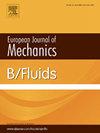Effect of particle aspect ratio in targeted drug delivery in abdominal aortic aneurysm
Abstract
Aneurysm is a permanent irreversible bulge in the artery that can occur with higher prevalence among elderly individuals. Although invasive surgical procedures can prevent their development, they come with considerable side effects. Recently, treatments based on targeted drug delivery have gained a lot of attention to suppress aneurysm growth. Numerical simulations have been shown to be of great role in the prediction of blood hemodynamics and vascular wall behaviour in the case of an aneurysm. Moreover, the utilization of high-fidelity approaches such as the Lagrangian frame of reference can address the motion characteristics of microbubble (MB) contrast agents in particulate flows. This study aims to investigate the effect of particle aspect ratio on the adhesion of oblate spheroid particles to the vascular wall. Accordingly, a two-way fluid–structure interaction (FSI) method consisting of a hyperelastic material model for the vessel along with a non-Newtonian, compressible model for blood was employed to simulate an abdominal aortic aneurysm (AAA). Moreover, the ligand–receptor binding concept has been utilized to address the quantification of MBs adhesion. Five sets of aspect ratios ranging from 1 to 9 have been investigated and results indicated that with the increase of the aspect ratio the rate of adhesion decreases. Two drastic changes in the particle number occurred due to the diastolic peak and negative velocity profile, respectively. However, it was concluded that the hydrodynamic of the MBs in terms of velocity and wall distance is rather insensible to the particle shape.
| 公司名称 | 产品信息 | 采购帮参考价格 |
|---|

 求助内容:
求助内容: 应助结果提醒方式:
应助结果提醒方式:


